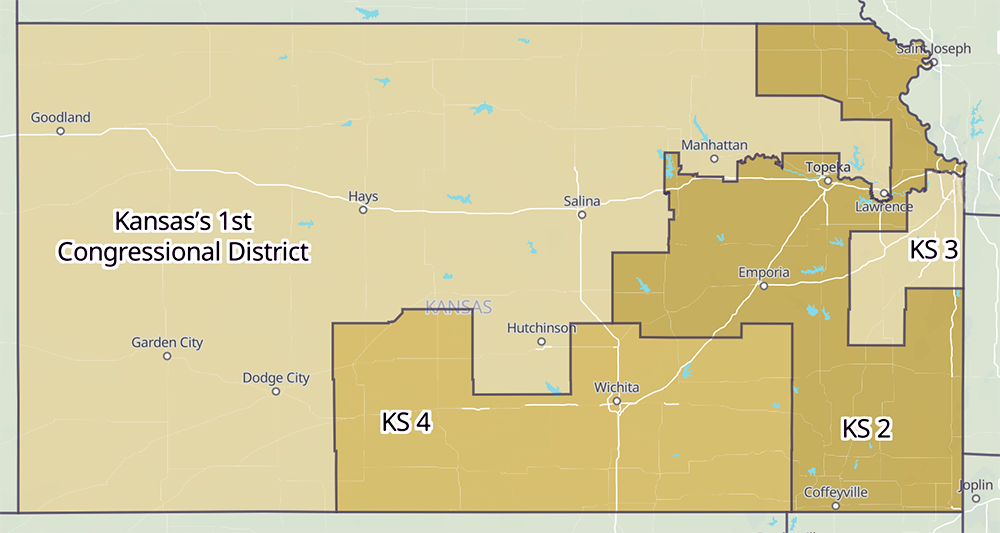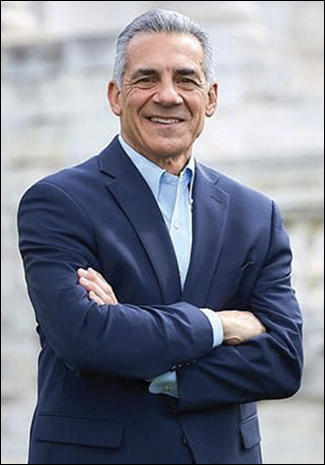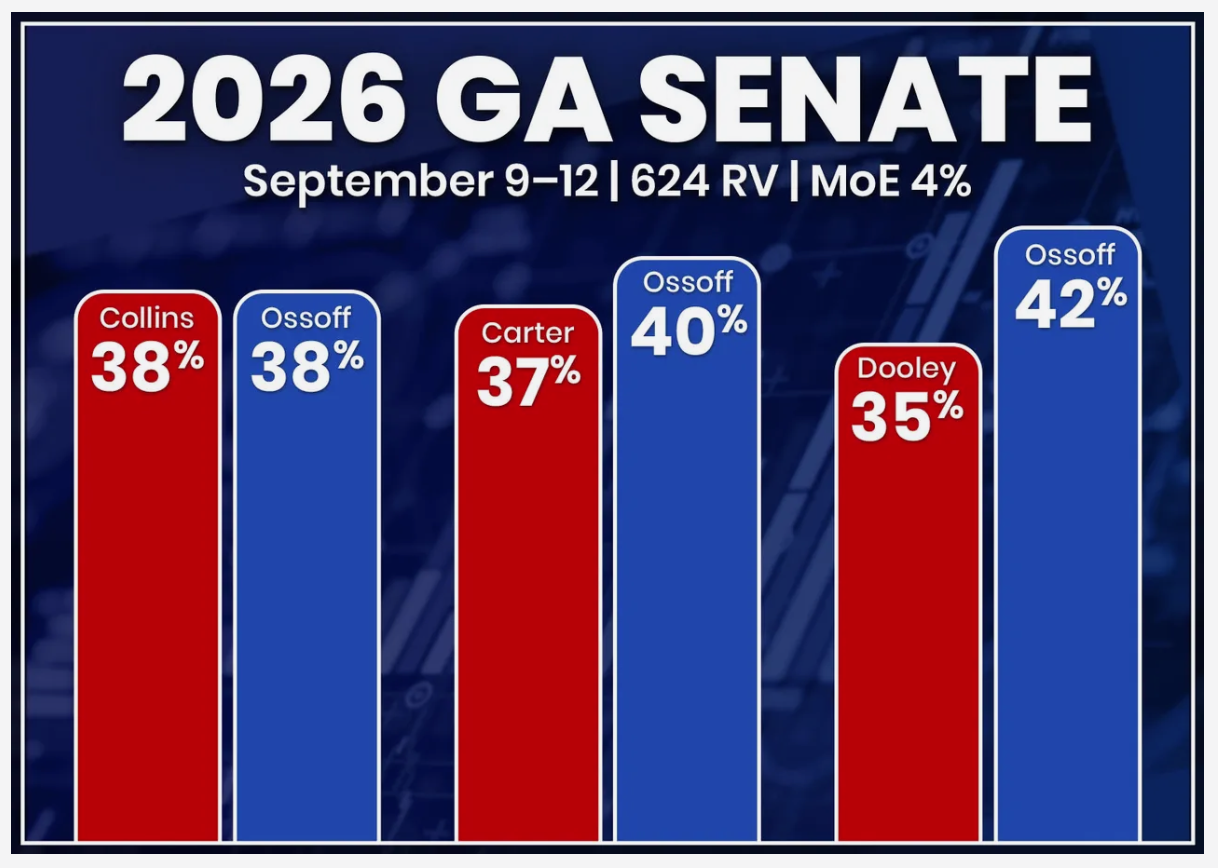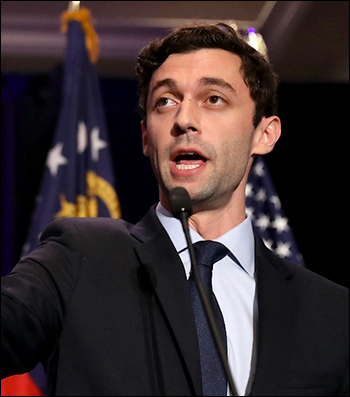
Kansas US Congressional Districts / Click on map above, or go to govtrack.us to see interactive map.
By Jim Ellis — Monday, Sept. 29, 2025
Senate
Kansas — The Republicans in the Kansas legislature are determining if they will call for a special legislative session to redraw the state’s congressional map. The Republicans have a veto-proof majority in both chambers, so they would theoretically be able to override Democratic Gov. Laura Kelly’s veto regarding map passage. A two-thirds vote of both houses is also required to call a special session. The GOP has the numbers, but their margin is very tight. Therefore, the situation is uncertain.
If the Republicans’ redistricting plan is successful and the lone Kansas Democratic US House member, Rep. Sharice Davids (D-Roeland Park), is targeted and her 3rd CD made unwinnable for her party, the Congresswoman will forgo re-election and instead challenge Sen. Roger Marshall (R) next year.
Alabama — A former White House aide and ex-military advisor to Alabama Sen. Tommy Tuberville (R) has entered the state’s open Senate race. Morgan Murphy now joins Attorney General Steve Marshall and Rep. Barry Moore (R-Enterprise) in vying for the Republican nomination. The eventual winner is a virtual sure bet to replace Sen. Tuberville who is running for Governor instead of for re-election.
Additionally, recently retired Auburn University men’s basketball coach Bruce Pearl ended speculation that he would run for the Senate with an announcement of non-candidacy.
Massachusetts — Last week, Rep. Jake Auchincloss (D-Newton) said he would not challenge Sen. Ed Markey (D) for renomination, but the door has apparently opened for two other House delegation members to potentially launch such a challenge. Both Reps. Seth Moulton (D-Salem) and Ayanna Pressley (D-Boston) each said they are now considering forging a Democratic primary against the Senator. Much time remains because Massachusetts has one of the latest primaries in the nation. In 2026, the Massachusetts primary vote is scheduled for Sept. 15.
New Hampshire — A new co/efficient survey (Sept. 10-12; 904 likely New Hampshire general election voters; 346 Republican primary likely voters; live interview & text) confirms that former Sen. John E. Sununu (R) entering the open New Hampshire Senate race would make the general election very competitive. According to the co/efficient ballot test, Rep. Chris Pappas (D-Manchester) would lead Sununu, 46-43 percent, a virtual tie. In a Republican primary ballot test, Sununu tops former Massachusetts Sen. Scott Brown, 40-23 percent.
Sununu was elected to the Senate in 2002 after serving three terms in the House. He defeated then-Gov. Jeanne Shaheen (D) to win the Senate seat. Six years later, Shaheen returned for a re-match and unseated Sen. Sununu in the first Obama presidential election year. She won two further terms and is retiring once this Congress ends. Sununu has not been on the ballot since losing his 2008 re-election campaign.
Virginia — Sen. Mark Warner (D) has drawn a Republican opponent. While talk about Gov. Glenn Youngkin (R) challenging the Senator has dissipated, state Sen. Bryce Reeves (R-Fredericksburg) has now become an official candidate. The state legislator has twice run for a different office — Lieutenant Governor and the US House, but failed both times to secure the party nomination. Sen. Warner will be favored to win a fourth term next year.
House
TX-29 — Former Houston City Councilman Jarvis Johnson (D) said publicly that he is considering challenging Rep. Sylvia Garcia (D-Houston) in the new version of the 29th District. Only 37 percent of the current 29th is in the new 29th, so Rep. Garcia’s incumbency factor would be lessened in such a Democratic primary race. The Houston-anchored seat is still solidly Democratic, so the serious action will occur in the March 3 primary.
TX-32 — Dallas Mayor Eric Johnson, who in 2023 left the Democratic Party and became a Republican, confirmed he is considering entering the newly created 32nd Congressional District that covers part of Dallas before stretching into east Texas. Current incumbent Julie Johnson (D-Farmers Branch) is most likely to seek re-election in the Democratic 33rd CD as opposed to what will become a Republican 32nd District. Before winning election as Mayor, Johnson served four terms in the state House of Representatives as a Democrat. He is ineligible to seek a third term as Mayor in 2027.
Governor
California — A surprising California Emerson College Poll (Sept. 15-16; 1,000 registered California voters; multiple sampling techniques) was released during the week providing bad news to Sen. Alex Padilla (D). The Senator is reportedly considering entering the open Governor’s race.
The ballot test again finds former Rep. Katie Porter leading the jungle primary field but with only a 16 percent preference figure. Following are two Republicans totaling 18 percent of the jungle primary vote, former Fox News host Steve Hilton (10 percent) and Riverside County Sheriff Chad Bianco (8 percent). Sen. Alex Padilla (D) is next posting only 7 percent support, which is a surprisingly low number for a sitting US Senator.
Another gubernatorial entry has emerged. Former state Assembly Majority Leader Ian Calderon (D) announced that he will join the crowded Governor’s primary calling for “a new generation of leadership.” Calderon is 40 years of age. The former four-term Assemblyman’s father, Charles Calderon (D), served in the state Senate and Assembly. He was elected Majority Leader in both chambers during his legislative career.
Minnesota — While Gov. Tim Walz (D) is now officially running for a third term, a new poll suggests he is in a battle for re-election. SurveyUSA, polling for Twin Cities television station KSTP (Sept. 15-18; 568 likely Minnesota voters) finds former state Senator and 2022 gubernatorial nominee Scott Jensen (R) trailing Gov. Walz by only a 46-41 percent margin.
The poll results also found Gov. Walz with a 47:47 percent job approval rating that features only 20 percent strongly approving and 34 percent strongly disapproving. The Governor and former Vice-Presidential nominee also fares poorly in southern Minnesota, a region he represented in the US House, and with Independents. Thus, the early polling suggests the 2026 Minnesota Governor’s race will be in the competitive realm.
Oklahoma — State Superintendent of Public Instruction Ryan Walters (R), who has had a controversial tenure but is a champion of the Republican Party’s right flank, announced his resignation to accept a job running a non-profit education organization. He was considered a potential gubernatorial candidate. The move is a boon to Attorney General Gentner Drummond who appears to be the leading GOP candidate for the party nomination. Becoming the Republican standard bearer is tantamount to winning the general election. Incumbent Gov. Kevin Stitt (R) is ineligible to seek a third term.
Virginia — A series of three September polls all find former Rep. Abigail Spanberger (D) leading Republican Lt. Gov. Winsome Earle-Sears by spreads beyond the polling margin of error. Pulse Decision Science (Sept. 3-5; 512 likely Virginia voters) posts Spanberger to a 48-43 percent edge. Christopher Newport University (Sept. 8-14; 808 registered Virginia voters) sees the Spanberger lead larger at 52-40 percent. Finally, in the most recently released survey, co/efficient (Set. 22-23; 1,024 likely Virginia voters) finds a result closer to the Pulse Decision study, 49-43 percent, also in Spanberger’s favor.
From the three data organizations that track and average poll results, Real Clear Politics, Decision Desk HQ, and Race to the White House, all see Spanberger leading in an average range falling between 7.3 percentage points (Real Clear Politics) and 9.4 (Race to the White House). The Virginia election is Nov. 4, so political prime time is now fully underway.
Wisconsin — Badger State Rep. Tom Tiffany (R-Minocqua) announced late this week that he will risk the congressional seat he won in a 2020 special election to enter his state’s open Governor’s race next year.
The move had been expected, and Rep. Tiffany’s chances of winning the Republican primary so far against Washington County Executive Josh Schoemann and manufacturing company CEO Bill Berrien are good. Tiffany’s strong conservative record gives him the inside track in attracting backing from right of center political organizations which have proven important in Republican primaries.
Democrats who have announced their own gubernatorial campaigns are Lt. Gov. Sara Rodriguez, state Sen. Kelda Roys (D-Madison), state Rep. Francesca Hong (D-Madison), and Milwaukee County Executive David Crowley. Gov. Tony Evers (D) is not standing for a third term. We can expect to see a toss-up open seat gubernatorial election here next year.
City & State
Boston — After suffering a better than 3:1 negative showing in the September jungle primary, businessman Josh Kraft (D), son of New England Patriots owner Robert Kraft, has withdrawn from the Nov. 4 Mayoral general election. This means that Mayor Michelle Wu (D) has won a second term in that she is now unopposed in the regular election.







